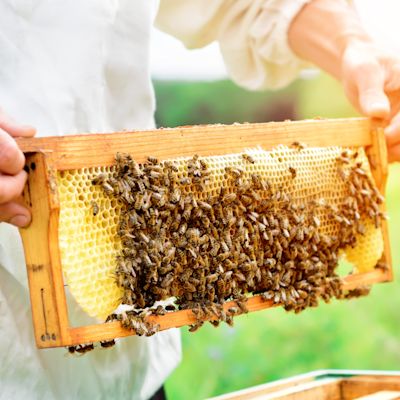Your favorite wines rely on specific temperatures, so wine grapes can accumulate the compounds that result in distinct varieties. Climate change puts all of this in jeopardy.
In our third episode of Your Food’s Roots with Zooey Deschanel, we’re covering one of the most beloved food items that brings together families, friends, and communities—wine! Unfortunately, wine as we know it is in danger because of climate change. Climate change will not only affect wine, but our entire food system as farmers adapt to having too much rainfall or not enough and unexpected cold snaps or hot spells—our food system relies on a delicate balance of temperatures, seasonal shifts, and our natural ecosystem in order to work effectively. As consumers, we are already empowered to make purchasing and lifestyle decisions to proactively combat this threat. Here’s what you need to know, and what you can do to decrease your carbon footprint.
How does climate change affect wine?
The grapes that are required for our favorite wines and champagnes come from specific compounds—these compounds are dependent upon specific temperatures so they can accumulate in the fruit. It’s these compound that create aroma, which influences what we taste when drinking wine.
As temperatures get warmer, grapes ripen faster, which means they are more sugary and lose their acids, according to Dr. Kimberly Nicholas of Lund University, an expert on global sustainability and climate change. More sugar in your grapes results in more alcohol, while the loss of acids means refreshing wines, such as rieslings, lose their crispiness. Lastly, wine compounds change with higher temperatures, so the taste of wine is markedly different—for example, the black pepper aroma in a Syrah may lose its potency.
What will the future of wine look (and taste) like?
There are over 1,000 varieties of wine grapes, yet 12 varieties are used for over 80% of the wine market in many countries, according to The Harvard Gazette. One option for wine producers is to produce and experiment with drought-tolerant varieties of grapes, and try new farming practices that provide more shade for the fruit. Dr. Nicholas has also seen winemakers remove alcohol or add acid to allow for more wine balance.
Winemakers are also moving their production to cooler areas to counter warming temperatures. This method alters the terroir, thereby changing the taste of a particular vintage. This is a short-term solution, and it is quite costly.

What you can do to support a better food system.
Wine is a prime example of a food we enjoy that is entirely reliant on the environment; every glass of wine you consume is a reflection of where the grapes were grown, what the temperatures were like, and which post-harvest methods were implemented to balance the flavor.
In order to continue to enjoy the wines we currently drink, let’s each contribute to reducing our carbon footprint, especially when it comes to food. Here are some tips:
Support your local food economy
There are many positive outcomes that arise from supporting our local food economies, especially when it comes to reducing our carbon footprint. When you support your local farmers, either by shopping at a co-op, subscribing to a CSA, or going to your local farmers’ market, you reduce the number of miles your food has to travel.
You also have the opportunity to speak with your farmer when you shop at a farmers’ market and ask about their farming practices. Surprisingly, food transportation only accounts for 11% of lifecycle greenhouse gas emissions; 83% come from the production process on farms, according to a study conducted by the Carnegie Mellon University. That’s why it’s important to support farmers that implement sustainable and regenerative farming practices.
Lastly, look beyond the label—just because a farmer is selling organic produce doesn’t automatically mean they have sustainable farming practices. Similarly, some farmers may not be able to afford a certified organic label, but implement sustainable farming practices. Some questions you can ask your farmer include:
- What’s in season right now? What are you currently growing?
- How do you take care of your soil?
- What do you use to deal with pests?
- How do your animals graze?
- Are your animals raised indoors or outdoors?
Grow your own food
When you grow your own food, you take ownership of where your food comes from, and gain a better understanding of how much effort it takes for food to get to your plate. Growing your own food means there’s minimal food mileage incurred, your food retains more of its nutrients, and you can ask informed questions when you purchase food from farmers or restaurants.
Our partner company, Lettuce Grow, is a prime example of how consumers and companies can empower themselves to grow their own food in a sustainable manner by reducing water usage (by over 90%) while maximizing space with vertical growing.
Reduce your food waste
On average, Americans waste about 40% of the food they buy. To put this further in perspective, if food waste was a country, it would be the third largest global greenhouse gas emitter. So how can you reduce your waste?
- Plan your meals ahead of time and buy what you need.
- Take inventory of your fridge, and make a grocery list before shopping.
- Start freezing or fermenting your food to extend its life.
- Eat or freeze your leftovers.
Beyond wine, climate change will affect how we grow our food and which varieties we can grow. According to a recent report issued by the UN, an increase of 1.5 degrees Celsius will adversely impact our agriculture and natural ecosystems.
There’s hope—as consumers, we can drive change with what we buy through our daily lifestyle decisions. It’s time to vote with our dollars for the change we believe in and support the people, farmers, and companies whose mission and practices are in alignment with our own. Let’s get more informed, ask questions, and make decisions for a healthier planet and people!
Read Next


